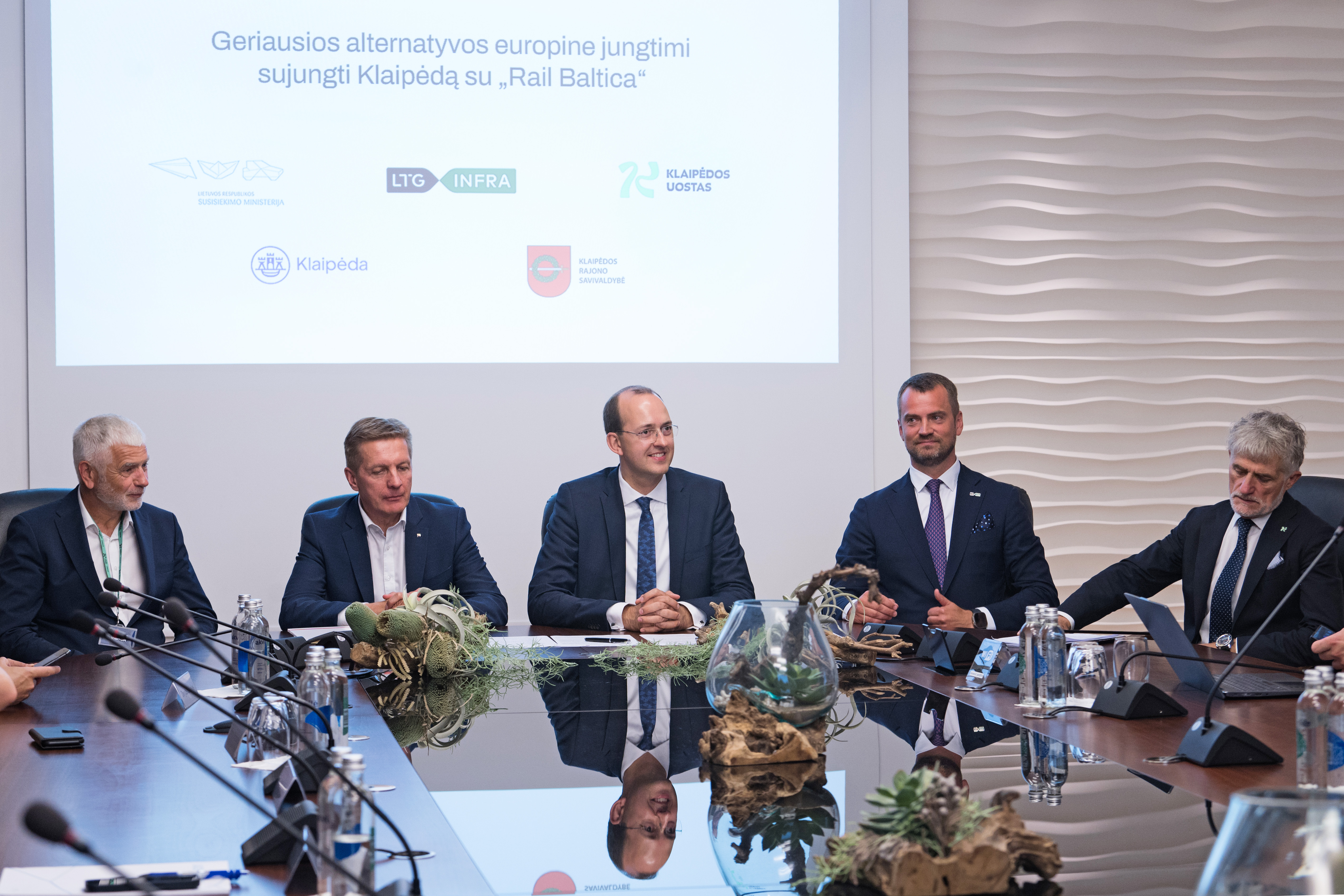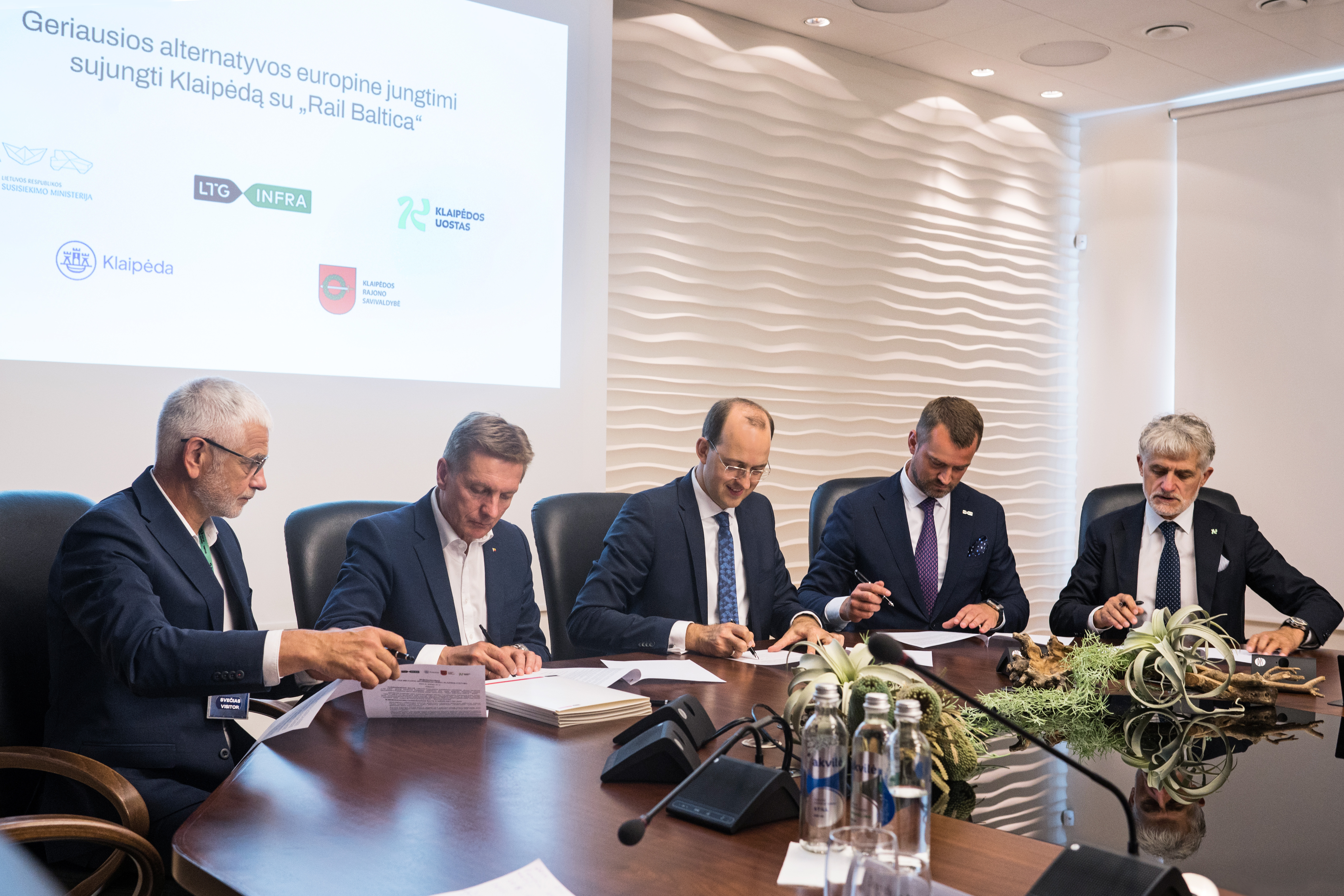
Memorandum signed on the development of the European gauge railway line to Klaipėda
KLAIPEDA : A Memorandum was signed in Klaipėda, providing for closer cooperation in decision-making on developing the new European gauge railway line to Klaipėda.
The Memorandum was signed by the heads of the Ministry of Transport and Communications, “LTG Infra”, the public railway infrastructure manager of the “Lithuanian Railways” Group (LTG), the Klaipėda Port Authority, the municipalities of Klaipėda city and Klaipėda district. The signatories to the Memorandum agreed to take a joint decision on the optimal alternative route for the gauge railway line to Klaipėda.


According to the Minister of Transport and Communications Marius Skuodis, who took part in the round table discussion initiated jointly by the Ministry of Transport and Communications and LTG, the European gauge railway line to Klaipėda is of particular importance for Lithuania and the whole Baltic Sea region.
“The first legal basis has already been established at the EU level: the European gauge railway link to Klaipėda has been included in the EU-wide TEN-T Regulation, in other words, it has been recognized as a project of pan-European interest. As well as being an excellent opportunity to increase the resilience of the EU transport system as a whole, this link is an important prerequisite for full passenger and freight mobility and military mobility. Now there are no more questions about whether it is needed, and we are moving to the next stage: we have to decide together which alternative to the new gauge railway line to Klaipėda would best meet the needs of local communities, municipalities, businesses, and the whole country”, – says Minister of Transport and Communications M. Skuodis.
According to LTG Group CEO Egidijus Lazauskas, LTG is currently planning to carry out an architectural modelling study of the Lithuanian railway network. It will be based on at least three alternatives, covering technological and technical feasibility and regulatory compliance. The initial alternatives for the European gauge railway to Klaipėda are via Šiauliai, from Kaunas via Tauragė or Pagėgiai, or from Kazlų Rūda via Tauragė.
“The European gauge railway to Klaipėda will provide opportunities to improve transport and logistics connections in the Baltic region and Eastern Europe, create an attractive alternative to road transport, and help Klaipėda Port to diversify its activities and open up new markets,” says E. Lazauskas.
Algis Latakas, Head of Klaipėda Port Authority, says that it is very important for Klaipėda Port to implement this project as soon as possible, because once the Rail Baltica railway is operational, the cargo flows may settle down, bypassing the Lithuanian port city, which would have a significant impact on the port’s competitiveness. “The European gauge railway line to Klaipėda Port is a key step in the port’s integration into the transport network of Central and Western Europe. This project would not only improve the efficiency of freight transport, but also strengthen our competitiveness in the region. The European railway line is crucial for diversifying the port’s activities and opening up new markets,” says A. Latakas.
On 13 June, the Council of the EU adopted the new Trans-European Transport Network (TEN-T) Regulation, the changes to which will affect the migration of the existing rail network to the European rail network and the development and expansion of the TEN-T network. As proposed by Lithuania, the TEN-T Regulation foresees connecting Lithuania and the Klaipėda Port to the Baltic, Black Sea, and Adriatic corridors via a 1435 mm wide European gauge railway line.
A European railway line to Klaipėda would fundamentally change Lithuania’s transport system: it would speed up connections between Vilnius and Klaipėda, and would help to diversify Klaipėda’s port and railway operations more quickly. The European gauge railway line to Klaipėda is also important for military mobility.

